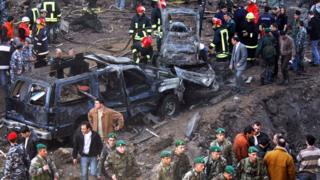 Image copyright
Getty Images
Image copyright
Getty Images
The long-awaited verdict is due in the trial of four men allegedly involved in the killing of former Lebanese PM Rafik Hariri and 21 others in a 2005 bombing.
The defendants - suspected members of the Lebanese Shia militant group Hezbollah - were tried in absentia by a special tribunal in the Netherlands.
Outrage at the attack in Beirut forced Hezbollah's backer Syria to pull its troops out of Lebanon after 29 years.
Hezbollah and Syria's government denied any involvement in the attack.
More than 220 people were also injured when a van filled with explosives blew up as Mr Hariri's convoy passed along Beirut's seafront corniche.
The killing was a watershed moment for Lebanon and gave rise to rival alliances that shaped Lebanese politics for years afterwards.
Mr Hariri's son, Saad, led the anti-Syrian, pro-Western grouping that emerged, and subsequently served three terms as prime minister himself.
He is attending the hearing at the Special Tribunal for Lebanon (STL), which is based in a village on the outskirts of The Hague, when the verdict is delivered on Tuesday.
The whereabouts of the four accused - Salim Jamil Ayyash, Hassan Habib Merhi, Hussein Hassan Oneissi and Assad Hassan Sabra - are not known.
None of them commented on the trial. But their court-appointed defence lawyers dismissed the prosecution's case, saying it relied on circumstantial evidence and did not prove they were guilty beyond reasonable doubt.
What's the case about?
On the morning of 14 February 2005, Rafik Hariri - then an MP who aligned himself with the opposition in parliament - was travelling in a motorcade past Beirut's St George Hotel when a bomb hidden a van exploded.
The blast created a huge crater in the street, and left nearby vehicles smouldering and shopfronts blown out and blackened.
Hariri had been one of Lebanon's most prominent Sunni politicians and at the time of his death had backed calls for Syria to withdraw its troops, which had been in Lebanon since 1976 following the start of the country's civil war.
The killing brought tens of thousands of demonstrators onto the streets in protest against the pro-Syrian government, with the finger of blame for the assassination pointed at Lebanon's heavily influential neighbour.
The government resigned two weeks later and Syria withdrew its forces that April.
After collecting evidence, the UN and Lebanon's government set up the STL in 2007 to investigate the bombing, and four suspects were ultimately put on trial in absentia on charges that included conspiracy to commit a terrorist act.
A fifth suspect, Hezbollah military commander Mustafa Amine Badreddine, was removed from the indictment after he was killed in Syria in 2016.
Hezbollah's supporters have dismissed the trial, arguing that the STL process is not politically neutral.
A country in crisis
By Paul Adams, BBC News, Beirut
More than 15 years after the grim events of February 2005, how much does this verdict matter, here where it all happened?
Beirut is still reeling from the port explosion exactly two weeks ago. The physical and political implications of that disaster overshadow everything.
As if that wasn't enough, the country is on the verge of another Covid-induced lockdown. Cases are spiking and people are anxious.
And then there's Lebanon's desperate economic decline, which has accelerated since the end of last year. The currency has collapsed, unemployment has spiralled and people are going hungry.
Judging by the crowds at Beirut's international airport, some wealthier Lebanese citizens are simply leaving the country.
Fifteen years after Rafik Hariri's assassination, Lebanon is a very different place. The Syrian army is long gone. Hezbollah is bigger and stronger, deeply embedded in every walk of political, economic and military life.
The group's opponents may well believe that it had a hand in the explosions of 2005 and 2020, but such is its stranglehold on Lebanon that few expect the tribunal's verdict to have any practical effect.
Just look at Mr Hariri's younger son, Saad. For more than a decade, he's been in a marriage of convenience with the very organisation accused of killing his father.
He's already served twice as prime minister, in coalitions which included Hezbollah. If he wants to be prime minister again, he'll need its support once more.